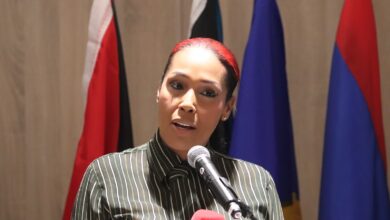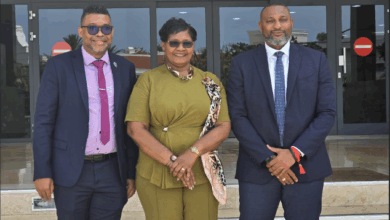When you my colleagues conferred on Jamaica the singular privilege of hosting this ceremony, I had no hesitation in selecting as our venue the Mona Campus. There could be no more fitting location for this historic occasion, since this is indeed Caribbean soil. For nearly six decades now, the University of the West Indies has served as the fountainhead for regional learning, research and intellectual analysis. It has become the cradle which imbued in so many of us an unflinching commitment to regionalism. It has taken the Community sixteen long years since the Grand Anse Declaration of 1989 to make this leap for the full implementation of the provisions of the CARICOM Single Market.
There have been unexpected curves and obstacles along the way. It is fitting that today we recognise the persistence and ingenuity of those who have never wavered in our quest to achieve sustained economic development. The Single Market will enhance trade and economic relations with third States. It will promote our international competitiveness and enable the effective coordination of foreign and economic policies. This ceremony establishes beyond doubt that our Regional Organisation has weathered the political turbulence and economic storms, external and domestic, of its adolescent years.
We can take considerable pride, not only in our longevity as one of the oldest functional integration groups anywhere in the world, but also in the depth and breadth of the integration process so evident in this ceremony of formal inauguration. While this is a moment to pause and reflect on our achievements over the years, we must not rest or become complacent. Formidable challenges still exist as we move boldly forward in the pursuit of closer regional collaboration, within a global economy that is hostile to the interests of Small Island Developing States.
The implementation of the Single Market will result in unprecedented market access for our goods and services and a marked expansion in our businesses large and small, traditional and non-traditional. With new investments and expanded businesses, we will enjoy enhanced levels of economic growth and employment and ultimately higher standards of living for our people. This, for all Leaders of CARICOM will be a rewarding outcome for years of hard work.
The Single Market and, ultimately, the Single Economy must be seen as building blocks towards developing greater trade and economic cooperation with our immediate neighbours in the Caribbean basin, our partners in the Hemisphere, and also to strengthen our arrangements with traditional partners in the European Union.
Six (6) Member States will today reaffirm their declaration to make the CARICOM Single Market become a reality for OECS countries by the middle of this year. This will usher in a new spirit of cooperation and a further strengthening of ties between our CARICOM membership.
It is my fervent hope that with the holding of free and fair elections in Haiti next month, a Government which passes the litmus test of democracy and is prepared to honour the tenets contained in the CARICOM Charter for Civil Society, will be able to resume its rightful place at our Conference table and eventually accede to the rights and obligations of the CSME.
Member States of CARICOM must continue to address, as a matter of urgency, the improvement in the efficient functioning of the Secretariat to support the next phase. In addition, measures that have been agreed with regard to Governance in the Community, and the creation of the accompanying framework and institutions that are necessitated by the CSME must be pursued expeditiously.
Any analysis of the benefits to each of us as individual States, which is based purely on balance of trade statistics, is inherently superficial because it fails to calculate the gains to be made from a pooling of our collective resources and moreso in an era where traditional preferences for primary commodities have disappeared.
It is knowledge and creative skills which will determine our chances of success in a global marketplace, where the provision of unique and quality service holds the key to our survival.
In the current communication landscape, with a seeming emphasis on what is sensational and instant, it is sometimes said that information on the CSME suffers because it is not sufficiently ‘sexy’.
If the Common Market was perceived by some as a romantic or idealistic notion in 1973, for each of our Member States, it has now become an absolute imperative. I make this bold assertion because the CSME plays two fundamental roles in conditioning CARICOM’s interface with the external environment.
First, it determines the policy foundation, which must guide CARICOM’s external trade policy with Third Parties and therefore establishes the limits of CARICOM’s negotiating ambit in the subject coverage of our external trade negotiations.
Second, it provides a framework in which CARICOM countries, and by extension, CARICOM firms, can enhance global competitiveness in order to capitalise on market access opportunities secured through external negotiations.
The small size of the combined regional space and the openness of our economy make it imperative for CARICOM to rapidly consolidate the regional market and policies. This must be the bedrock as we formulate common negotiating strategies and positions.
The incomplete status of some aspects of the Single Market is certain to undermine the effectiveness of that strategy. The absence of an operational regime in areas such as competition policy, investment and government procurement serves to complicate the execution of a common negotiating strategy in these areas and often places CARICOM in the invidious position of not being able to negotiate the full range of subjects. This impedes our capacity to engage on the full range of trade issues and in turn could undermine the credibility of the Region’s overall negotiating stance. It diminishes the attractiveness of the Region as an economic partner.
And so we must move quickly to complete the membership and coverage of the CSME so that we do not impair the conduct and efficacy of the external trade negotiations. We must forge a commonality of purpose and a unity of action in order to increase our leverage in those external trade negotiations where we are engaged.
In a few years, we must successfully tackle the harmonisation of economic, monetary, fiscal and trade policies of participating Member States, to enable the second pillar, the Single Economy, to enter into force. It is my ardent hope that we will not retreat in the face of these challenges.
I am sure, as I prepare to depart the political stage, you will allow me one final personal indulgence. It is on this Campus that my passion for Caribbean regionalism commenced. As the sole CARIFTA Minister involved in the conduct of those earlier negotiations which resulted in the Treaty of Chaguaramas, still holding political office, I confess it has been an arduous and sometimes disconcerting struggle over these 33 years. But we have come a long way from Chaguaramas to Mona.
Today, I implore you never to abandon that passionate commitment to the full advancement of the Region which has allowed us to fulfil this part of the dream today. The challenges abound, but with unity of purpose and direction, the Region will conquer whatever mountains we encounter on the journey so that all people of the Caribbean can realise their full economic and social potential.
The people we serve will judge us on the basis of the actions we have taken to enhance their lives and that of future generations.
Let us therefore, together advance, with courage and determination.





